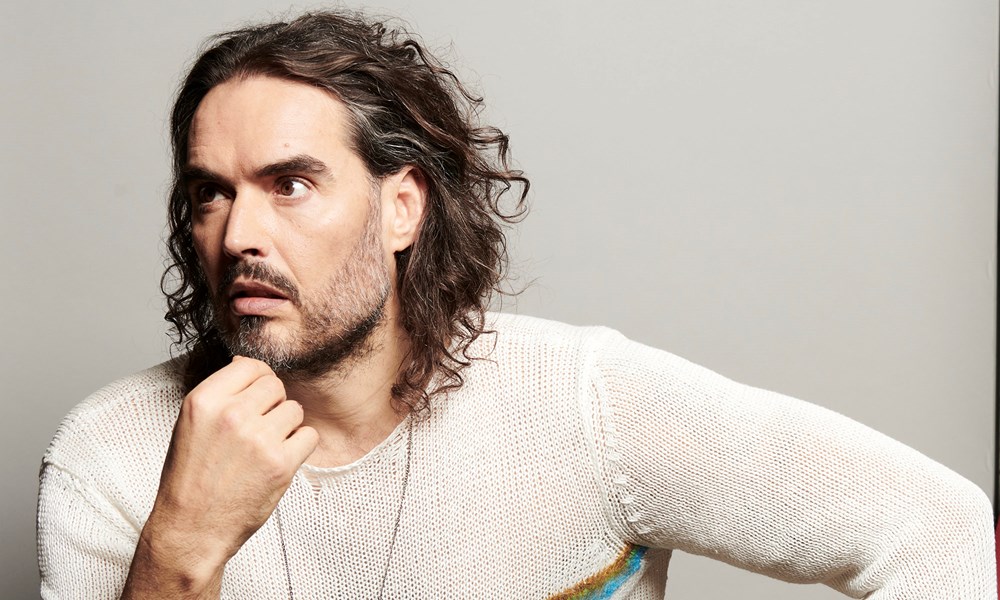How do we cheer on someone’s walk towards Christ without minimising the pain of their past actions? As Russell Brand speaks of needing a personal relationship with Jesus months after being accused of sexual offences, Emma Fowle explores

Source: russellbrand.com
If living a perfect, sinless life were a prerequisite for salvation, not one of us would make the grade - not least the Apostle Paul, author of much of the New Testament and arguably the greatest evangelist (after Jesus) ever to walk the face of the earth.
“Here is a trustworthy saying that deserves full acceptance: Christ Jesus came into the world to save sinners—of whom I am the worst,” says Paul, referring – with a beautifully understated elegance – to his past misdemeanours and God’s grace over them (1 Timothy 1:15).
Before Jesus chose to reveal himself to Paul (then Saul) on the Damascus Road, the man who would take the gospel to the known world had “approved” of the stoning of Stephen and then “began to destroy the church. Going from house to house, he dragged off both men and women and put them in prison.” (Acts 8:1-2)
Once a blasphemer
I once wrote some of Paul’s other words in 1 Timothy in the front of a Bible and gave it to my dad: “Even though I was once a blasphemer and a persecutor and a violent man, I was shown mercy because I acted in ignorance and unbelief. The grace of our Lord was poured out on me abundantly, along with the faith and love that are in Christ Jesus” (v13-14).
Obviously becoming a Christian does not negate the harm caused by one’s actions. Victims still have a right to justice
At the time, he was estranged from us, living a crazy life fuelled by steroids and cocaine, working as an illegal debt collector and embroiled in an affair with a woman half his age. I was a new Christian, vacillating between praying for his salvation and wanting him to be condemned forever because of the hurt he’d caused us.
After citing Paul, I wrote: “Read this. Only God can save you now; I’m sure as hell no one else can”. Clumsy, teenage words; a barbed attempt at wounding him into some sort of repentance.
He did eventually become a Christian (despite my awful approach to evangelism); he and my mum were baptised and they’ve spent the past 30 years serving God together in Christian ministry. Like Paul, his past was not a barrier to God radically redeeming his future.
Called to Christ
Which brings me onto Russell Brand. In his latest video, shared on X, the comedian talked about how he’d been reading the Bible “a lot more” and how “Christianity and in particular, the figure of Christ” were “becoming more important” to him.
He said he was reading Rick Warren’s The Purpose Driven Life and confessed that, “it’s taken quite a lot to recognise that I need a personal relationship with God.”
Brand signed off by quoting from the Bible: “It says in Galatians, it is our job to die so that as Christ died on the cross he might be reborn in us” before asking his followers to let him know their thoughts.
Why I Wear A Cross!
— Russell Brand (@rustyrockets) January 21, 2024
I'm interested to hear what YOU think, let me know. pic.twitter.com/kMcyYgvl7o
In any other circumstances, Brand’s comments on Jesus would have Christians jumping to their feet in applause, sharing the video and celebrating another public figure turning to Christ. And with Brand, we may even have been expecting it. The guy has been talking about prayer, running comedy shows that seemed more like church than church and generally encapsulating a whole generation’s new spiritual openness for years.
But that was before.
Past sins
In September 2023, Brand was accused of rape, sexual assault and emotional abuse against four women in a joint investigation by The Times, The Sunday Times and Channel 4’s Dispatches. He strenuously denied the claims. Brand is currently still under police investigation for ten non-recent alleged sexual offences and investigations at the BBC and Channel 4, where Brand worked, remain ongoing.
How should we respond to this?
Firstly, we should recognise that becoming a Christian does not negate the harm caused by your past actions. Victims have a right to justice.
Secondly, there’s a broader point to bear in mind. Safeguarding children, young people and vulnerable adults in our churches must remain our highest priority. Yes, someone may be saved by grace and fully forgiven by God, but if that person poses a risk to children and young people, there have to be serious consequences and safeguards in place. The instinct to remove any barrier to the gospel is a good one, but get matters of safeguarding wrong, and there’s the risk of very real harm.
Christ in control
Long after my parents were reconciled, we were still dealing with the consequences of my dad’s actions. Trust takes time to rebuild. The debt he accrued took much longer to repay. Not everyone was instantly overjoyed at his conversion – or convinced it was genuine.
Like Jonah’s feelings towards the people of Nineveh (Jonah 4), or the older brother when his prodigal sibling returned (Luke 15:28), our response to God’s generous forgiveness can be complicated for a whole host of reasons. I love the fact that these stories are in the Bible. It gives legitimacy to our human responses, while allowing for God’s grace to also do its work.
Like Paul, my dad’s past was not a barrier to God radically redeeming his future
In Acts 9, after God had temporarily blinded Saul, he spoke to Ananias, asking him to go and heal Saul’s sight. Ananias questioned God’s request, saying he had heard “all the harm” Saul had inflicted on Christians. In response, God confirmed that he had chosen Paul “to proclaim my name to the Gentiles”. But he added this curious footnote: “I will show him how much he must suffer for my name.” (v10-16)
In 2 Corinthians 11, Paul details what some of that looked like: from flogging to shipwrecks; imprisonment to, ultimately, death. I’m not suggesting that God punished Paul for his past. Rather that, as Jesus once explained to Peter (John 21:21-22), it is up to God to deal with each of us as he sees fit. Our job is to focus on him, and help others to, as well.
While navigating all of the difficult pastoral issues that a case like this will raise, lets’s commit to praying for those who have been victims of sexual violence, for Russell Brand, and for all those who have had Damascus Road experiences. Whatever our past, God desires a glorious future for us all.






































2 Readers' comments